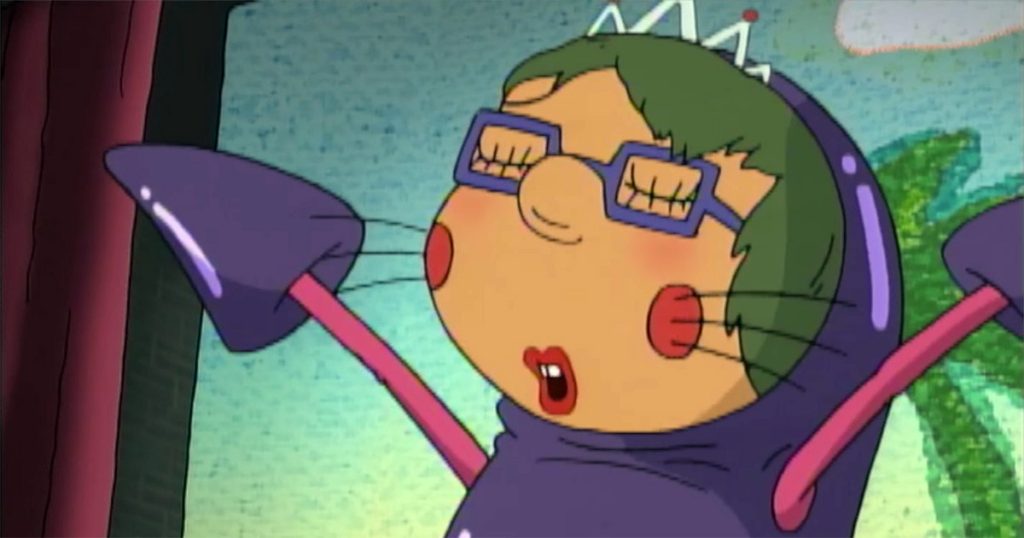Don’t forget to check out the rest of our coverage of Nicktoons Month!
My feminist role model has fins and gray hair.
Growing up a stone’s throw from Larchmont, New York — upon which the town in As Told By Ginger is based — I was a too-tall, duck-footed weirdo who thought she had to audition for the ingenue role in every school play. Grow my hair long. Correct my stance, my walk, gliding around my middle school like some kind of size-10 ballet dancer. An amazon Audrey Hepburn.
That’s the stuff of performance, and in particular the performance of femininity — something I didn’t know was optional for a long time. But years later, re-watching an episode of As Told By Ginger, I realized the antidote was in front of me all along.
Macie, one of Ginger’s best friends, is a testament to queer survival and the subversion of femininity in the closed circuit of New York’s wealthy suburbia. In “Come Back Little Seal Girl,” Macie proposes that they and their friend Dodie perform in the school’s talent show. Her idea: they give a tribute to the fictional Little Seal Girl, described as a “spunky little girl with the infectious smile who just happens to be half seal,” a character that the girls have loved since the second grade.
Hearing this description of an outgoing little girl who “just happens” to only half fit the mold for young women, I hear something else, as well: the language of someone trying to familiarize people with an identity that might cause fear. Openly admitting to be “half girl,” however you mean it, is always risky.
And it shows in the episode. Macie’s friends turn her down, saying the idea is too “immature.” She decides to move forward anyway, with her bold act, tellingly, slated to immediately follow a performance by Suburban Popular Girl™ Courtney, which consists of rollerskating in front of her own pink-emblazoned, blonde image.
For me, Macie’s proud celebration of loving the Little Seal Girl, a “half girl,” is not unlike the other ways that queer people and others subvert mainstream ideas of what masculine and feminine gender binaries look like. But in the time when As Told By Ginger ran, the world was only beginning to catch up.
Macie lives forever onscreen in a world that has not yet legalized equal marriage, where the best mainstream gay-ish media consists of “Will and Grace,” where the word “transgender” arose fairly recently. Where the idea of being “half girl,” or any kind of girl other than cis, straight, and white, was unacceptable, and remains perilously so for many people today.
She lives before Generation Z, the group just old enough now to tell us that gender isn’t really a thing — or, as The New York Times puts it, that thinks “the X/Y chromosome distinction seems a little passé.”
Macie lived, too, before I came out as queer, after realizing why it felt uncomfortable for so long to perform the role of the perfect straight girl: feminine, sweet, graceful.
Macie found comfort in her own skin far before I did, but in the world of As Told By Ginger, she was alone in that. In the most stomach-turning moment of the episode, Macie ends up apologizing to her friends for deciding to move forward with her act. “Sorry I was such a hothead,” she says, eyes downward cast.
Macie, we weren’t ready for you. But you helped make me. So for that, thank you.
Thanks for reading The Dot and Line, where we talk about animation of all kinds. Don’t forget to ❤ this article and follow us on Twitter and Facebook.
